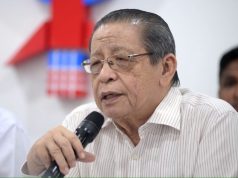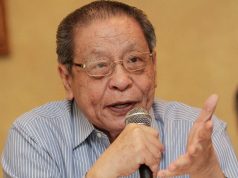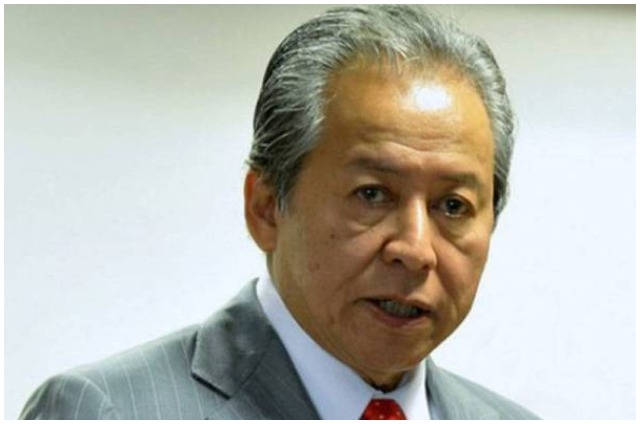Kota Kinabalu, Dec 26 – The intrusion by a group of terrorists from Southern Philippines into Kampung Tanduo, Lahad Datu in February, rattled the nation and marked a dark episode in Sabah’s history.
Although Sabah is no stranger to countless attempts by the so-called royal Sulu descendants to claim the land, the intrusion which created statewide panic was the worst.
However, with the quick mobilisation of security personnel and the setting up of the Eastern Sabah Security Command (ESSCom), with Lahad Datu as its headquarters, improved the community’s confidence in the area’s security.
This was further boosted with the demolition of several water villages and illegal settlements which could potentially serve as hideouts for intruders. Stringent checks were also practised at all entry points in the state.
The heavy monitoring and patrolling on land and sea, focusing on known illegal entry points, minimised attempts by foreigners from setting foot illegally on Sabah. This served a confidence-booster for Sabahans.
However, fear crept in when a 57-year-old Taiwanese tourist was shot dead at a resort on Pom-Pom island near Semporna, while his companion and compatriot, Chang An Wei, 58, was abducted in the early hours of Nov 15.
The couple was holidaying off Sabah’s east coast when Abu Sayyaf-linked gunmen stormed their villa and took her by boat to the Philippine island of Jolo.
On Dec 20, Chang’s abductors freed her in Southern Philippines before the Philippine authorities found her on the same day in a forested area between Maimbung and Indanan in Jolo.
Earlier, the Malaysian Government had assured of Chang’s safety as it was liaising with its Philippine counterpart.
About that time, ESSCom director-general Datuk Mohammad Mentek had made an impassioned call to island resort operators in the state, especially those in Sabah’s east coast, to cooperate with security personnel patrolling their areas.
In light of the incident, State Tourism, Culture and Environment Minister Datuk Masidi Manjun said a special task force comprising representatives from his ministry, the federal tourism and culture ministry, immigration department and other relevant agencies had been set up to ensure that only legal operators of any services, including lodging houses, were allowed to operate coastal tourism ventures in Semporna.
Early this year, the much-anticipated Royal Commission of Inquiry (RCI) to investigate the problem of illegal immigrants in Sabah finally saw its first sitting on Jan 14.
It was presided by a five-man panel led by former chief judge of Sabah and Sarawak Tan Sri Steve Shim Lip Kiong as chairman of the commission.
This came a little over five months since the RCI was set up and the appointment of Shim and his fellow commissioners were announced by Prime Minister Datuk Seri Najib Tun Razak in a sincere move to solve the longstanding problem faced by Sabah, with terms of reference to be observed, including the investigation of the number of immigrants in the state who were issued identity cards (ICs) or citizenship.
The other commissioners appointed to preside over the proceeding were former Universiti Malaysia Sabah (UMS) vice-chancellor Professor Datuk Dr Kamaruzzaman Ampon, former Kuala Lumpur police chief Datuk Henry Chin Poy Wu, former Sabah deputy chief minister Tan Sri Herman J. Luping, who was also the state attorney-general, and former Sabah state secretary Datuk KY Mustapha.
Since then, a series of proceedings were held and concluded on Sept 20 without much hassle to which, on the last day of proceeding, Shim quipped: “It has been a smooth process. There had been no tantrums, no throwing of chairs. All arguments were done in civilised order.”
The RCI saw 211 witnesses giving their testimonies, including high-profile politicians, namely former prime minister Tun Dr Mahathir Mohamad and Opposition Leader Datuk Seri Anwar Ibrahim, as well as vocal state leaders on the issue such as Sabah Deputy Chief Minister Tan Sri Joseph Pairin Kitingan and United Pasokmomogun Kadazandusun Murut Organisation (Upko) president Tan Sri Bernard Dompok.
Meanwhile, as a state rich in bidodiversity, Sabahans were shocked to hear that 14 endangered pygmy elephant carcasses were found at Gunung Rara Forest Reserve in Tawau.
Initially, state wildlife director Datuk Dr Laurentius Ambu said two highly-decomposed carcasses were found in early January, while 12 more carcasses of the rare sub-species of the Asian elephant were found after further inspection of the area.
The pachyderms were believed to have been poisoned.
In relation to the gruesome discovery, the authorities stumbled on a living three-month-old pygmy elephant which tried to revive its dead mother.
The story of the orphaned young elephant moved many to tears, but joy soon came when the calf, nicknamed ‘Joe’, was reported to be healthy and doing well at the Lok Kawi Wildlife Zoo near here under the care of the zoo’s staff, Augustine David.
Meanwhile, news of a 12-year-old schoolgirl allegedly raped by a 40-year-old man at a roadside near Kionsom Waterfall in Inanam in February caused fury among the people of Sabah, with women’s movements voicing out outrage.
The case has gone to the court which will give its decision on Jan 24.
On June 19, the state was jolted with news of three tourists from Hong Kong, including two women, injured when their vehicle was hit by a train near the Kota Kinabalu International Airport (KKIA) Terminal 1 at Jalan Lintas in Petagas near here.
In the 5.35pm incident, the tourists were on their way to KKIA to catch a flight that night, while the train was travelling from Kota Kinabalu to Beaufort.
The victims were sent to the Queen Elizabeth Hospital here, but one of them, a man in his 50s, who was the driver of the vehicle, died while receiving treatment.
– Bernama











